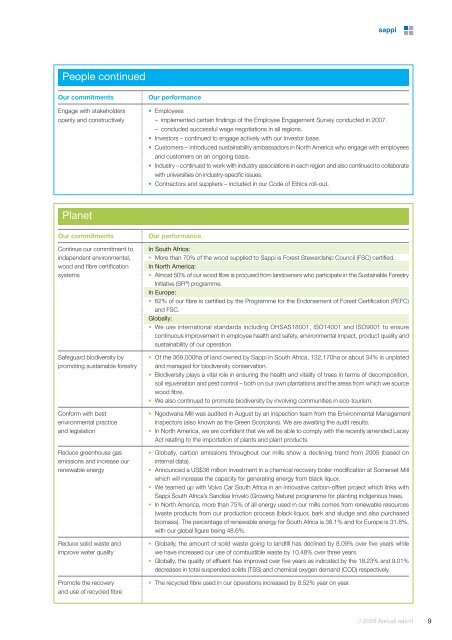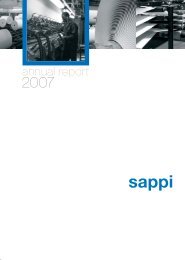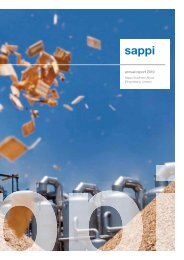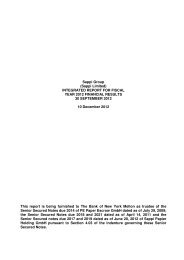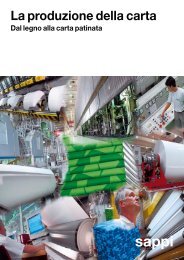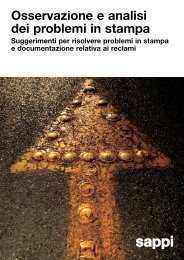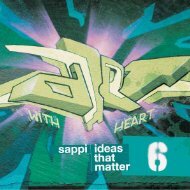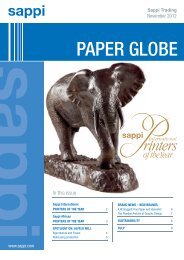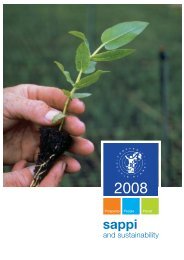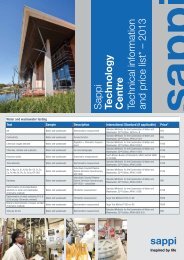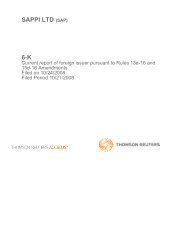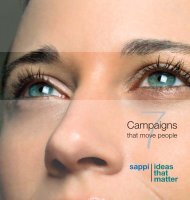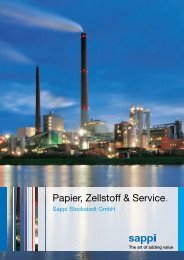2008 Annual report - Sappi
2008 Annual report - Sappi
2008 Annual report - Sappi
Create successful ePaper yourself
Turn your PDF publications into a flip-book with our unique Google optimized e-Paper software.
sappi<br />
People continued<br />
Our commitments<br />
Our performance<br />
Engage with stakeholders • Employees<br />
openly and constructively – implemented certain findings of the Employee Engagement Survey conducted in 2007.<br />
– concluded successful wage negotiations in all regions.<br />
• Investors – continued to engage actively with our investor base.<br />
• Customers – introduced sustainability ambassadors in North America who engage with employees<br />
and customers on an ongoing basis.<br />
• Industry – continued to work with industry associations in each region and also continued to collaborate<br />
with universities on industry-specific issues.<br />
• Contractors and suppliers – included in our Code of Ethics roll-out.<br />
Planet<br />
Our commitments<br />
Continue our commitment to<br />
independent environmental,<br />
wood and fibre certification<br />
systems<br />
Safeguard biodiversity by<br />
promoting sustainable forestry<br />
Conform with best<br />
environmental practice<br />
and legislation<br />
Reduce greenhouse gas<br />
emissions and increase our<br />
renewable energy<br />
Reduce solid waste and<br />
improve water quality<br />
Promote the recovery<br />
and use of recycled fibre<br />
Our performance<br />
In South Africa:<br />
• More than 70% of the wood supplied to <strong>Sappi</strong> is Forest Stewardship Council (FSC) certified.<br />
In North America:<br />
• Almost 50% of our wood fibre is procured from landowners who participate in the Sustainable Forestry<br />
Initiative (SFI ® ) programme.<br />
In Europe:<br />
• 62% of our fibre is certified by the Programme for the Endorsement of Forest Certification (PEFC)<br />
and FSC.<br />
Globally:<br />
• We use international standards including OHSAS18001, ISO14001 and ISO9001 to ensure<br />
continuous improvement in employee health and safety, environmental impact, product quality and<br />
sustainability of our operation.<br />
• Of the 369,000ha of land owned by <strong>Sappi</strong> in South Africa, 132,170ha or about 34% is unplated<br />
and managed for biodiversity conservation.<br />
• Biodiversity plays a vital role in ensuring the health and vitality of trees in terms of decomposition,<br />
soil rejuvenation and pest control – both on our own plantations and the areas from which we source<br />
wood fibre.<br />
• We also continued to promote biodiversity by involving communities in eco-tourism.<br />
• Ngodwana Mill was audited in August by an inspection team from the Environmental Management<br />
Inspectors (also known as the Green Scorpions). We are awaiting the audit results.<br />
• In North America, we are confident that we will be able to comply with the recently amended Lacey<br />
Act relating to the importation of plants and plant products.<br />
• Globally, carbon emissions throughout our mills show a declining trend from 2005 (based on<br />
internal data).<br />
• Announced a US$36 million investment in a chemical recovery boiler modification at Somerset Mill<br />
which will increase the capacity for generating energy from black liquor.<br />
• We teamed up with Volvo Car South Africa in an innovative carbon-offset project which links with<br />
<strong>Sappi</strong> South Africa’s Sandisa Imvelo (Growing Nature) programme for planting indigenous trees.<br />
• In North America, more than 75% of all energy used in our mills comes from renewable resources<br />
(waste products from our production process (black liquor, bark and sludge and also purchased<br />
biomass). The percentage of renewable energy for South Africa is 38.1% and for Europe is 31.8%,<br />
with our global figure being 48.6%.<br />
• Globally, the amount of solid waste going to landfill has declined by 8.09% over five years while<br />
we have increased our use of combustible waste by 10.48% over three years.<br />
• Globally, the quality of effluent has improved over five years as indicated by the 18.23% and 9.01%<br />
decreases in total suspended solids (TSS) and chemical oxygen demand (COD) respectively.<br />
• The recycled fibre used in our operations increased by 8.52% year on year.<br />
// <strong>2008</strong> <strong>Annual</strong> <strong>report</strong><br />
9


